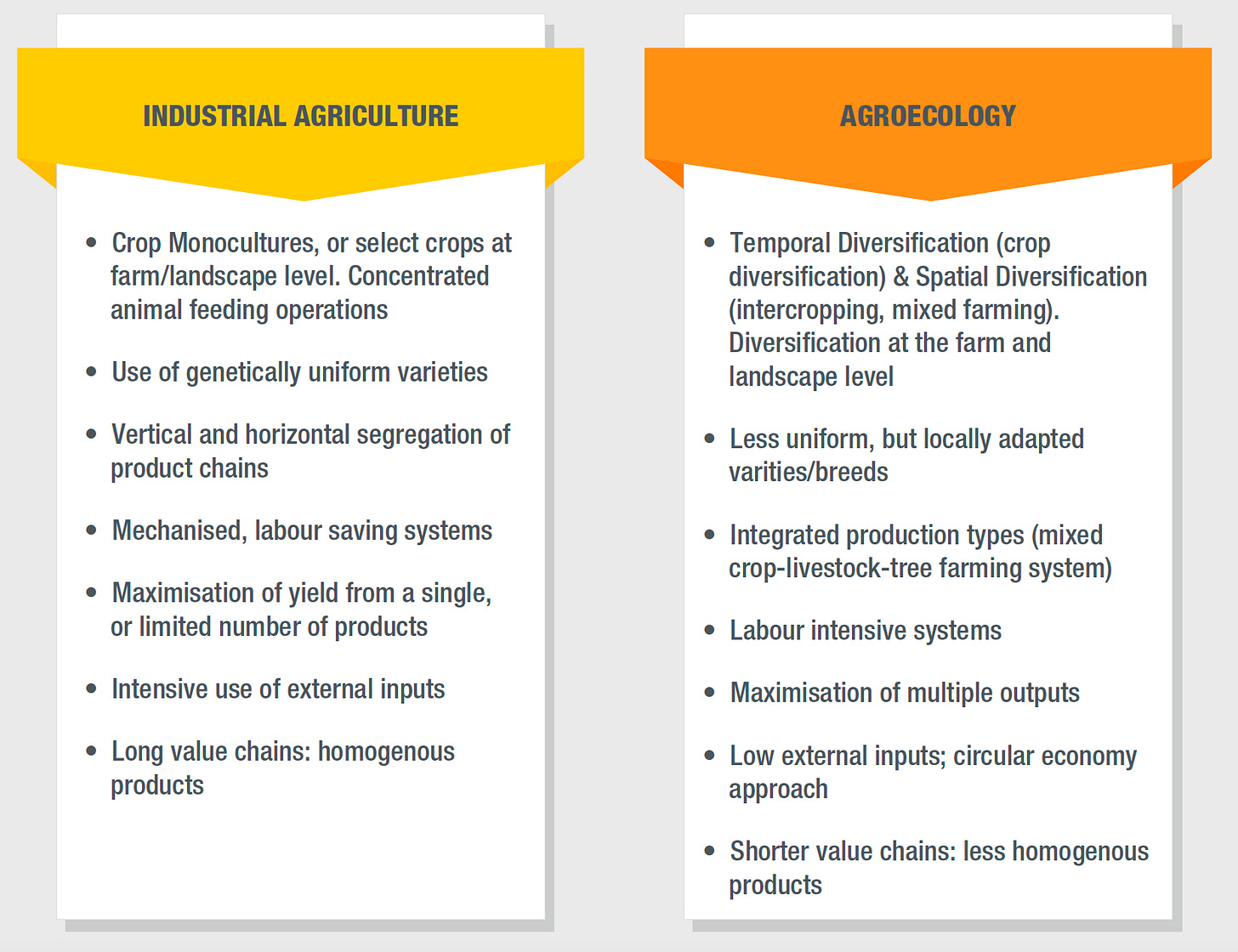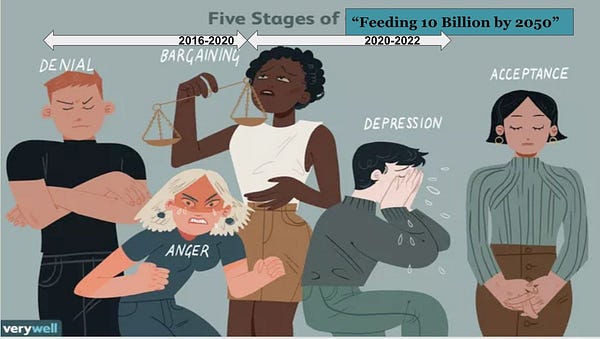Saturday Sprouting Reads: The Clash of Paradigms and the Unbundling of Global Agriculture
Has the Ukraine War revealed the high-voltage fault lines between the two paradigms of global agriculture?

Dear Friends,
Greetings from Hyderabad, India! My name is Venky and I write Agribusiness Matters. Welcome to Saturday Sprouting Reads!
About Sprouting Reads
If you've ever grown food in your kitchen garden like me, sooner than later, you would realize the importance of letting seeds germinate. As much as I would like to include sprouting as an essential process for the raw foods that my body loves to experiment with, I am keen to see how this mindful practice could be adapted for the food that my mind consumes.
You see, comprehension is as much biological as digestion is.
And so, once in a while, I want to look at a few articles or reports closely and chew over them. I may or may not have a long-form narrative take on it, but I want to meditate slowly on them so that those among you who are deeply thinking about agriculture could ruminate on them as slowly as wise cows do. Who knows? Perhaps, you may end up seeing them differently.
[Subscriber-Only] Open Network for Digital Commerce and the art of Loving Information Asymmetry
Indian Govt. is taking a definite anti-big Tech stance through ONDC - Open Network for Digital Commerce-to unbundle e-commerce marketplaces and their incestuous relationships with seller and buyer ecosystems.
The underlying premise is a simple, but powerful question that warms the cockles of my decentralized heart - What if we build a standard API for commerce across India? ONDC recently hosted a hackathon with NABARD with two problem statements to most of the familiar players in agritech universe.
“One,..integrate existing agri-tech e-commerce players on the ONDC network, and the second, to build innovative solutions that may accelerate adoption of the network enabled.”
This has incredible potential to upend the full stack plays of most agritech platforms that unwillingly become the source of information asymmetry while trying to attack the information asymmetry problem.
In this subscriber-only post, I dig into two kinds of marketplaces with a love-hate relationship with information asymmetry; mental models to think about drone business models; understanding Bighaat through the lens of online malls and the emerging hospitable funding climate for protected cultivation.
Clash of Paradigms and Remaking of Global Agriculture
On May 7, Syngenta CEO, Erik Fyrwald gave an interview to a local swiss newspaper.
“Depending on the product, yields in organic farming can be up to 50 percent lower. The indirect consequence is that people in Africa are going hungry because we are eating more and more oganic products. …..
….Organic farming requires larger areas and the fields usually have to be ploughed, which increases CO2 emissions"
Fyrwald later retracted his earlier statement in a LinkledIn post adding that “Organic farming clearly has a role to play, but it represents only about 1.5% of global agriculture.”
He further advocated “regenerative agriculture” which takes practices of cover crops, no-till, crop rotation from organic farming along with precision agriculture where ”pesticides are used in a targeted manner so that the fields do not have to be ploughed and the CO2 remains in the soil.”
Closer home, Dhruv Sawhney, COO, Nurture.farm, (UPL’s agritech venture )recently wrote an oped in TOI Blogs arguing the case against organic farming.
“Organic farming works reasonably well as a niche segment within an industrialised agricultural system. Producers save money by eliminating chemical inputs, and higher selling prices compensate for the lower yields from organic produce. However, when it comes to feeding a growing population with a limited number of people practising agriculture, one cannot ignore the role of synthetic fertilisers in reducing labour and pest infestations while increasing yields.”
It’s obvious.
Agrochemical industry globally has been perceiving organic farming as a threat, given the increased regulatory pressure to ban chemical pesticides in the EU and the Green deal which wants to reduce chemical pesticide and chemical fertilizer usage by 50% and 20% in 2030, while aiming for ‘at least 25% of the EU’s agricultural land under organic farming and a significant increase in organic aquaculture by 2030’.
Closer home, the Indian government expressed its soft corner for organic farming (preferring the term ‘natural farming’), while being cautious about the disastrous top-down organic farming experiment in Sri Lanka.
““Adoption of natural farming should not be done in knee-jerk fashion as was done in Sri Lanka (which banned fertiliser use). However, without compromising India’s food security, by 2030 India can afford to have natural farming in 30% of the area,” - Ramesh Chand, Niti Aayog
What underlies this preference is the emerging de-globalized agricultural norm that wants to close borders to secure its internal food security and build resilient muscles to combat climate change.
Indian Government’s stance could haven’t have been more succinct.
“India is now in a position to do this trade-off gradually…we are exporting 6-7% of production and if we are willing to take a hit on that food output by setting aside 20% of acreage to organic farming, production will come down by 6-7%… we will not have any surplus to export ($5-6 billion/annum),” - Ramesh Chand
Earlier, the Indian Government published a draft notification in May 2020, soliciting feedback from industry stakeholders with the potential prohibition of 27 pesticides.
If you go by the recent research that has been emerging globally and in India, along with the extreme fuzziness of the term organic, one could argue that Fyrwald and Dhruv have a point.
However, researchers like Bruno Dorin who has been studying the natural farming experiment underway in Andhra Pradesh have posed valid counter-arguments to the arguments posted against organic farming, backed with data from the natural farming experiments underway.
“The State of Andhra Pradesh is taking the lead in India in popularising Natural Farming. Starting from approximately 40,000 farmers and 704 villages in 2016-17, over 695,000 farmers across 3011 villages were practising natural farming in 2019-20. Third party evaluations have shown improvement in yields (most significantly in paddy, bengal gram, pulses and chillies) and farm net income (Galab et al., 2020) and (Kumar et al., 2020). It was also shown that significant cost savings can be made by governments themselves through reductions in costly fertiliser and electricity subsidies…” - From Niti Aayog Book “A New Paradigm for Indian Agriculture", co-authored by Neelam Patel, Bruno Dorin and Ranveer Nagaich
In the report, the authors sum up the two paradigms thus:

Regular readers of Agribusiness Matters might remember how I built on Bruno Dorin’s work to conceptualize Future of Agriculture scenarios several months ago.
The Indian Government’s soft corner towards the agroecological paradigm also comes from the post-covid realization that local supply chains are much more resilient and the Lewis model of structural transformation that underpins industrial agriculture paradigms is unfeasible and comes with severe environmental challenges.
The ongoing farmer protests in the Netherlands (now virally spreading towards Italy) painfully show what happens when we ignore the hard-earned lesson of Sri Lanka’s attempt to enforce climate change and sustainability induced changes from top-down.
All the political games surrounding the farmer protests in the Netherlands sound eerily similar to the reality I encountered when I tracked Indian farmer protests in great detail.
Part-1: Setting the Context 🔒 | Part-2: No Country for Middle-Men | Part-3: In Defense of the Government 🔒 | Part-4: Samudra Manthan in the World of Agriculture: | Part-5: "Annadata" Conundrum" And Mapping the Cultural Wars of Agriculture 🔒 | Part-6: Can I offer you a grey pill on farm laws? | Part -7: Greta Thunberg and the aftermath of Farm Law Politics in India | My TEDx Talk on the need to dialogue in context with the farm laws.
Considering all the data that I am seeing, it’s weird dark humour feeling inside my gut when I observe how my responses to “Feeding 10 Billion by 2050” have been evolving over time.
I should hopefully move towards “Acceptance” sooner:)
So, what do you think?
How happy are you with today’s edition? I would love to get your candid feedback. Your feedback will be anonymous. Two questions. 1 Minute. Thanks.🙏
💗 If you like “Agribusiness Matters”, please click on Like at the bottom and share it with your friend.



